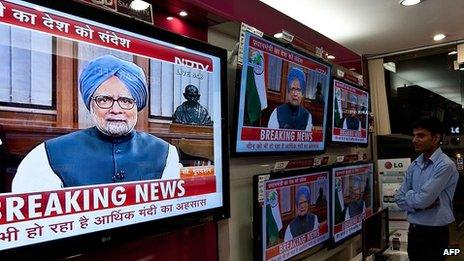India's Prime Minister Singh defends economic reforms
- Published

Mr Singh made a rare televised address to respond to concerns about his economic plan
Prime Minister Manmohan Singh has defended his economic reforms, saying they are necessary to fight an economic slowdown in India.
The reforms include allowing foreign supermarket giants to buy large stakes in India's retail sector.
They have been fiercely opposed by trade unions and prompted coalition ally, the Trinamool Congress party, to resign from government.
Mr Singh said the changes were needed to revive investor confidence.
"We have to restore the confidence of foreign investors... Money does not grow on trees and that is why we have made these decisions," Mr Singh said in a rare national televised address.
Earlier on Friday, six ministers belonging to the Trinamool Congress party led by Mamata Banerjee formally resigned from the coalition led by Mr Singh's Congress Party.
Under the government's proposal, global firms such as Walmart and Tesco will be able to buy up to a 51% stake in multi-brand retailers in India.
Multinational retailers already have outlets in India, but at present they can sell only to smaller retailers. This decision allows them to sell directly to Indian consumers.
The reforms, which were rolled out last week, also include cutting diesel subsidies and limiting subsidies on cooking gas.
Officials hope that increasing foreign investment will boost the stock market and encourage Indian companies to borrow cheaply abroad.
Mr Singh, who was credited with spurring India's massive economic growth as finance minister in the 1990s, has been under intense political pressure in recent years because of a number of unpopular policies.
India's economy has been growing at its slowest rate in two years and the government has struggled to balance a need to boost growth and prevent spiralling inflation.
- Published21 September 2012
- Published19 September 2012
- Published3 September 2012